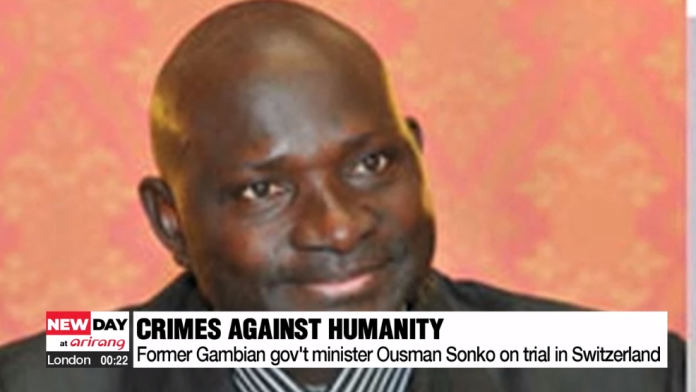
Gambian former interior minister Ousman Sonko said Switzerland was not qualified to lecture on human rights as he took the stand for the first time Tuesday as he denies charges of crimes against humanity.
Sonko has been in Swiss custody ever since his arrest in January 2017 after applying for asylum following his sacking from the West African nation’s government.
He is accused of a string of serious offences allegedly committed between 2000 and 2016 under the regime of former Gambian dictator Yahya Jammeh.
Sonko, who turned 55 Tuesday, denies the charges. If convicted, he faces life imprisonment.
“I don’t think Switzerland is qualified or is competent to lecture anyone on human rights,” he told the Federal Criminal Court in the southern city of Bellinzona.
“It is essential to understand that as minister of the interior, I had no operational powers.
“I played a purely political role and was always careful… never to interfere with the responsibilities of the heads of service, who had full operational responsibility.”
Before the trial, Sonko’s lawyer Philippe Currat told AFP responsibility for the events on the charge sheet lies with the National Intelligence Agency and not with his client.
Sonko said: “The NIA has never been under my authority and… I had no power to propose any regulations whatsoever concerning it.”
The trial is possible because Switzerland made two major legislative changes in 2011.
It enshrined crimes against humanity — serious violations committed as part of a large-scale attack targeting civilians — into the Swiss criminal code.
It also recognised the principle of universal jurisdiction.
This allows countries to prosecute alleged atrocity crimes — which in addition to crimes against humanity, comprise war crimes and genocide — regardless of where they were committed.
At Monday’s opening, Sonko’s lawyers asked judges to dismiss the case, claiming there had been violations of the fundamental rules of procedure.
They also argued that Sonko should not be tried on any counts predating 2011 when the Swiss laws came into force.
But the judges on Tuesday refused to dismiss the case and decided the issue of so-called retroactivity would be examined later.
“We are moving forward. It’s positive,” said Benoit Meystre, legal adviser for the NGO Trial International, which filed the complaint leading to Sonko’s arrest.
It is the second time in less than a year that Swiss judges have tried a foreign defendant accused of committing crimes against humanity in his own country.
Last June, the Federal Criminal Court’s appeals chamber upheld the 20-year prison sentence imposed on former Liberian warlord Alieu Kosiah, handing down a verdict of crimes against humanity for acts committed well before 2011.
The proceedings in the Sonko case which are being held in German are likely to last a month, with a verdict not expected before March.
The judges refused Tuesday to allow the entire trial to be translated into English, to the annoyance of the defence lawyers and plaintiffs.
There are 10 complainants in the case, according to the NGO, including eight “direct victims”.
Jammeh ruled The Gambia with an iron grip from 1994 to 2016.
Sonko is accused by Swiss prosecutors of “having supported, participated in and failed to prevent systematic and generalised attacks as part of the repression carried out by the Gambian security forces against all opponents of the regime”.
The charges span from 2000 to 2016 and include nine counts of crimes against humanity.
He is accused of having “deliberately killed, tortured, raped and unlawfully deprived individuals of their liberty in a serious manner”.
Sonko is accused of committing the alleged crimes first within the army, then as inspector general of the police, and finally as the interior minister from 2006 to 2016.
Trial International says he is the highest-ranking state official ever to be tried in Europe for international crimes under the principle of universal jurisdiction.


